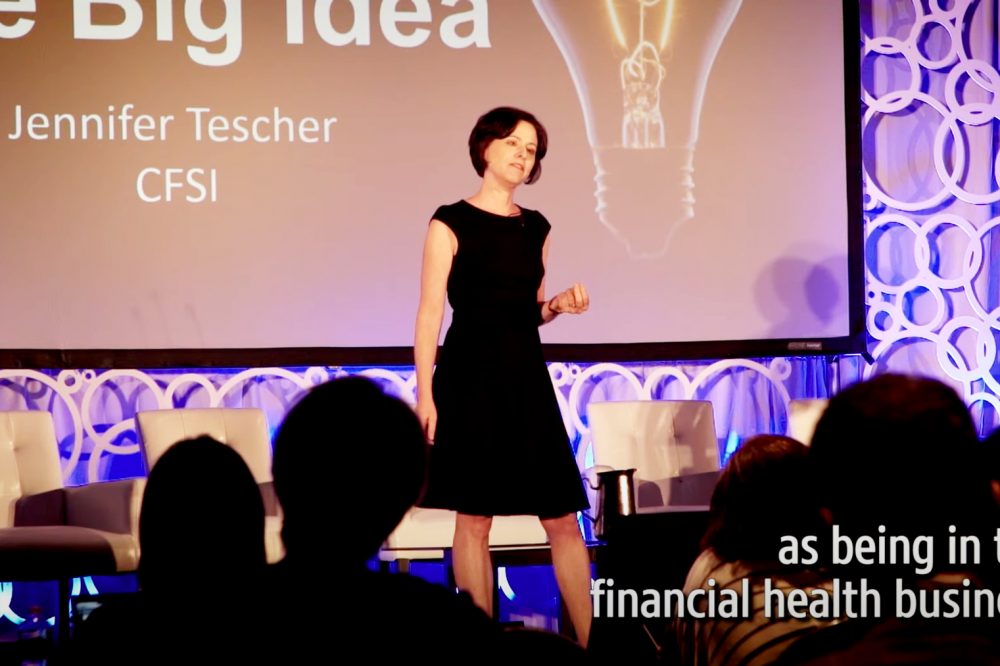The following is a transcript from Jennifer Tescher’s Big Idea at the EMERGE 2016 Forum in New Orleans.
I don’t know about you, but as a frequent flyer, those announcements when you get on the airplane about “put on your seatbelt”, or “no smoking in the lavatory”, those just sort of wash over me at this point. But there is one part of the standard airline announcement that I still play close attention to. It goes something like this…
“In the sudden loss of cabin pressure, oxygen masks will drop from above your seat. To start the flow of oxygen, pull the mask towards you, place it over your nose and mouth, secure the elastic band around your head, and breathe normally. Make sure to put your mask on before helping others.” So why is it that I’m focused on the oxygen announcement?
Well, about six months ago we got a call from our friends at Wright-Patt Credit Union. Wright-Patt is the largest credit union in the state of Ohio with about $3.3 Billion in assets and about 300,000 members. They’re also one of our newer Financial Health Network members. As credit union executives began attending network events and learning more about our financial health framework, they called us and said, “We really like this thinking… this financial health thing. It really jives with our own thinking about how we want to run our credit union, but how do you actually do financial health? We really want to be in the financial health business. How do we get started?”
Now if you had decided that you wanted to get in better shape, you might start by visiting your doctor for a check up, physical or maybe take a health assessment… a fitness assessment at the gym. Well really it’s no different with financial health and we told the folks at right path what you need is a full financial health check up. They said, “Well, that sounds interesting. What is it?” We explained that a financial health check up is a way of assessing how your consumers are faring in terms of their own financial health and how well your institution is poised to help them along their journey.
We first start by surveying your customers to assess their financial vital signs and we then segment and group your customers based on how well or how poorly they’re doing. Then we assess your products and services and business practices. Your treatment plan, if you will, to see how likely that plan is to really be effective in helping your consumers. Wright-Patt liked this idea a lot, but they had another idea for us.
They said, “If we’re gonna check on the health of our customers and on the readiness of our institution, we probably should also be checking on the people who do the work… on our own employees.” And that’s when I started thinking about oxygen masks. So do you know why the airline reminds you to put your mask on first before helping others? They remind you of that because if the plane is low on oxygen and you suddenly pass out, you’re not gonna be of much help to your kids or to someone else on the plane who might need assistance. And Wright-Patt understood this idea. They understood that for them to be successful in having their customers view them as being in the financial health business, they needed to start at home with their own employees.
Now, most employers understand that if their employees’ physical health is impaired, if folks are not healthy, that they’re not gonna be as productive on the job and cost are gonna go up. And that’s why you see an increasing number of employers offer expanded wellness benefits like free gym memberships. But financial health is really no different. If you’re stressed about money, you’re not gonna be able to focus on the task at hand.
There’s also a really tight connection between physical and financial health. In one of the chapters in the “What It’s Worth” book recently published by the San Francisco Fed and our friends at CFED, it details some new focus group research in which a participant said, “If you want me to lower my blood pressure, help me pay my bills.” It’s hard enough to help your customers improve their financial health. It’s even harder when the people who are supposed to be helping them are struggling in the same way. How do you give cogent advice if you’re facing the same set of problems?
And then there’s the irony factor. If you work at a frozen yogurt shop, you’re probably not going to make a lot of money, but you’re going be rich in FroYo. If you work at Macy’s, you’re going to get a discount on clothes. And, so if you work for a financial services provider, you’re going to expect financial health to be a perk. And if your employees don’t believe that you care about their financial health, it’s going to be pretty hard for them to convey that idea to your customers.
And so, we thought Wright-Patt’s idea was a really good one and when they hired us to do that financial health check up, we also agreed to survey their 700 employees. And what we found was that their employees were facing many of the same challenges that their customers were. Wright-Patt was wise to realize that, as they started their financial health journey, they needed to start at home with their own employees because you always put your own oxygen mask on first.
Wright-Patt’s experience is one we might all consider. Collectively, all of us in this room work for companies and organizations that employ well over a million people. What if we gave them all a financial health check up? What do you think we’d learn? All of you are here because your company in some way is interested or committed to this idea of financial health. And so, how powerful would it be if you all decided to start that journey focused on the people who are doing the work.
If we want to improve financial health in America, we’re really gonna have to start at home with our employees. But why just our employees? I mean we get it, we’re in financial services and all, but as we’ve talked about, financial health is about everyone. So, why wouldn’t we be talking to and including employers from other industries? From hospitality, from retail, from healthcare… And helping them understand that they too need to be in the financial health business. Now, that’s focusing on financial health where people work.
What about where people live? Paying rent, getting a mortgage, getting homeowners insurance… Why not invite the housing industry into this room? The landlords, the realtors, the homebuilders and help them see that they too need to be in the financial health business. And while we’re at it, why not include mayors and other local elected officials to help them understand that if they want to improve the health of their cities, they’ve got to focus on the financial health of their own citizens.
And what about where people learn… At colleges and universities whose job it is to churn out graduates with skills around how to live and how to work? If they want to improve their graduation rates and make sure they’re turning out students who know how to live a good financial life, then they too need to be in the financial health business. They need to be part of this conversation. We sometimes forget that financial health is really a metaphor for physical health. I never forget it, and those who have heard me speak before know that I like to extend that metaphor sometimes beyond its rightful use. But why not just get beyond the metaphor already? Why not build a bridge between physical and financial health? And invite doctors and hospitals and public health officials to the table, to help them understand that they too are in the financial health business.
I started out today by talking about how exciting it is to see the financial health tent really growing and expanding.

But what if all of the people who need to be involved in financial health were here?
What if all of the entities I just described understood that they were part of the financial health business and that they were here in the financial health tent with us helping to hold up the stakes because they see a stake in this work as well? Think about who would be here and how much progress we could make against our audacious goal of trying to improve financial health in America. Well, I’m here to tell you this afternoon that you’re not gonna have to imagine that much longer because that’s where this movement is going, and that’s my big idea. Thanks very much.

